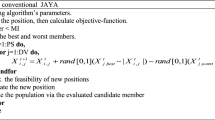Abstract
A large amount of calculation exists in a complex engineering optimization problem. The swarm intelligence algorithm can improve calculation efficiency and accuracy of complex engineering optimization. In the existing research, the surrogate model and the swarm intelligence algorithm are only two independent tools to solve the optimization problem. In this paper, we propose the surrogate-assisted crow swarm intelligent search optimization algorithm (SACSA) by combining the characteristics of swarm intelligence algorithm and surrogate model. The proposed algorithm utilizes the initial samples to construct the surrogate model, and then the improved crow search algorithm (CSA) is applied to obtain optimal solution. Finally, the proposed algorithm is compared with EGO, MSSR, ARSM-ISES, AMGO and SEUMRE, MPS, HAM algorithms. The comparison results show that the proposed algorithm can find a global optimal solution with fewer samples and is beneficial to improving the efficiency and accuracy of calculation.
Similar content being viewed by others
References
J. Jing, Z. Lei, Z. Hui, Z. Le and S. Shengdao, Interactive swarm intelligence algorithm based on master-slave gaussian surrogate model, ICIC 2018: Intelligent Computing Methodologies, Cham, Switzerland (2018) 682–688.
Z. Yang, H. Qiu, L. Gao, X. Cai, C. Jiang and L. Chen, A surrogate-assisted particle swarm optimization algorithm based on efficient global optimization for expensive black-box problems, Engineering Optimization, 51 (4) (2019) 549–566.
F. Rehbach, J. Stork, M. Zaefferer and T. Bartz-Beielstein, Comparison of parallel surrogate-assisted optimization approaches, The Genetic and Evolutionary Computation Conference, Kyoto, Japan (2018) 1348–1355.
D. Lim, J. Yaochu, O. Yew-Soon and B. Sendhoff, Generalizing surrogate-assisted evolutionary computation, IEEE Transactions on Evolutionary Computation, 14 (3) (2010) 329–355.
Z. Aimin and Z. Qingfu, A surrogate-assisted evolutionary algorithm for minimax optimization, IEEE Congress on Evolutionary Computation, Piscataway, NJ, USA (2010) 1–7.
L. G. Fonseca, H. S. Bernardino and H. J. C. Barbosa, A genetic algorithm assisted by a locally weighted regression surrogate model, International Conference on Computational Science & Its Applications, Verlag, Berlin, Germany (2012) 125–135.
D. Rodriguez-Roman, A surrogate-assisted genetic algorithm for the selection and design of highway safety and travel time improvement projects, Safety Science, 103 (2018) 305–315.
C. Sun, Y. Jin, J. Zeng and Y. Yu, A two-layer surrogateassisted particle swarm optimization algorithm, Soft Computing, 19 (2015) 1461–1475.
S. Rahmani, M. Ebrahimi and A. Honaramooz, A surrogate-based optimization using polynomial response surface in collaboration with population-based evolutionary algorithm, Advances in Structural and Multidisciplinary Optimization, Springer International Publishing, Cham (2018).
A. Askarzadeh, A novel metaheuristic method for solving constrained engineering optimization problems: Crow search algorithm, Computers & Structures, 169 (Jun.) (2016) 1–12.
D. G. Krige, A statistical approach to some basic mine valuation problems on the witwatersrand, Journal of the Chemical, Metallurgical and Mining Society of South Africa, 52 (6) (1951) 119–139.
P. S. Palar and K. Shimoyama, On efficient global optimization via universal Kriging surrogate models, Structural and Multidisciplinary Optimization, 57 (2018) 2377–2397.
Z. H. Han, Y. Zhang, C. X. Song and K. S. Zhang, Weighted gradient-enhanced kriging for high-dimensional surrogate modeling and design optimization, AIAA Journal, 55 (2017) 4330–4346.
N.-C. Xiao, K. Yuan and C. Zhou, Adaptive kriging-based efficient reliability method for structural systems with multiple failure modes and mixed variables, Computer Methods in Applied Mechanics and Engineering, 359 (2020) 112649.
K. Yuan, N.-C. Xiao, Z. Wang and K. Shang, System reliability analysis by combining structure function and active learning kriging model, Reliability Engineering and System Safety, 195 (2020) 106734.
S. G. Cho et al., Statistical surrogate model based sampling criterion for stochastic global optimization of problems with constraints, Journal of Mechanical Science and Technology, 29 (4) (2015) 1421–1427.
R. G. Regis and C. A. Shoemaker, A quasi-multistart framework for global optimization of expensive functions using response surface models, J. of Global Optimization, 56 (4) (2013) 1719–1753.
D. R. Jones, M. Schonlau and W. J. Welch, Efficient global optimization of expensive black-box functions, J. of Global Optimization, 13 (1998) 455–492.
D. Huachao, S. Baowei, D. Zuominand and W. Peng, Multistart space reduction (MSSR) surrogate-based global optimization method, Structural and Multidisciplinary Optimization, 54 (2016) 907–926.
L. Teng, W. Di, G. Xiaosong, G. G. Wang and L. Li, Efficient adaptive response surface method using intelligent space exploration strategy, Structural and Multidisciplinary Optimization, 51 (2015) 1335–1362.
H. Jie, Y. Wu and J. Ding, An adaptive metamodel-based global optimization algorithm for black-box type problems, Engineering Optimization, 47 (11) (2014) 1–22.
I.-B. Chung, D. Park and D.-H. Choi, Surrogate-based global optimization using an adaptive switching infill sampling criterion for expensive black-box functions, Structural and Multiisciplinary Optimization, 57 (2018) 1443–1459.
Acknowledgments
This research is supported by the National Natural Science Foundation of China (Grant No. 51475082).
Author information
Authors and Affiliations
Corresponding author
Additional information
Huanwei Xu is an Associate Professor in Electronic Science and Technology of China. His research interests include multidiscipline design optimization, intellient optimization algorithm and surrogate model and time-varying reliability.
Liangwen Liu is a graduate student in Mechanical and Electrical Engineering, University of Electronic Science and Technology of China. His main research direction is surrogate model based optimization and intelligent algorithm.
Miao Zhang is a graduate student in Mechanical and Electrical Engineering, University of Electronic Science and Technology of China. Her main research direction is reliability optimization design.
Rights and permissions
About this article
Cite this article
Xu, H., Liu, L. & Zhang, M. Research on crow swarm intelligent search optimization algorithm based on surrogate model. J Mech Sci Technol 34, 4043–4049 (2020). https://doi.org/10.1007/s12206-020-2215-8
Received:
Revised:
Accepted:
Published:
Issue Date:
DOI: https://doi.org/10.1007/s12206-020-2215-8




